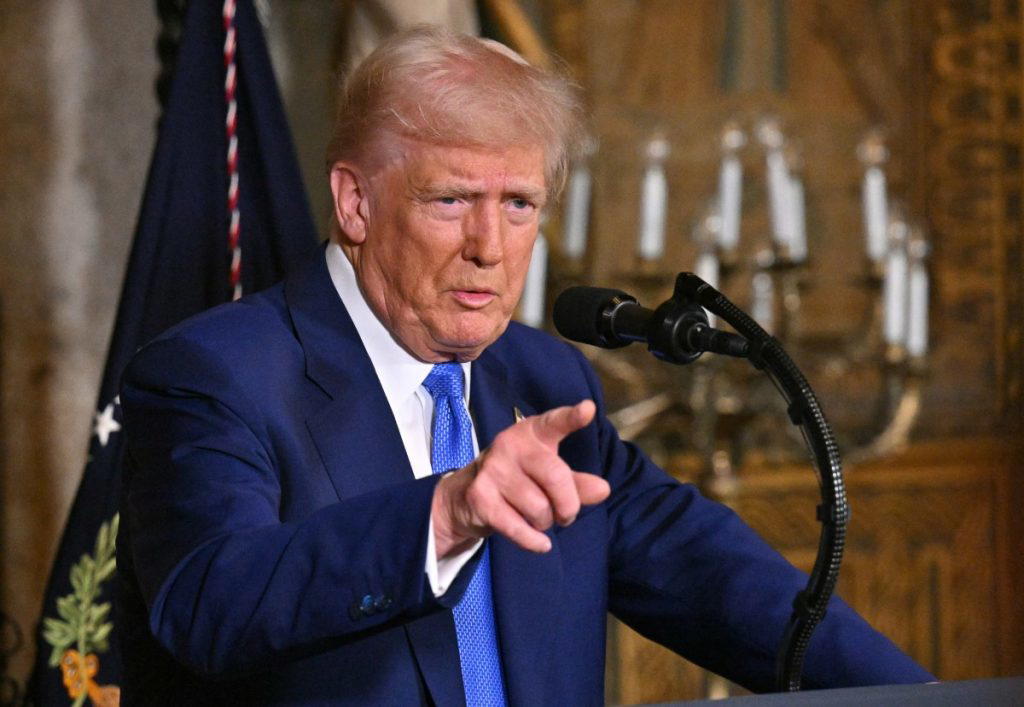
...
As Trump announces new tariffs todayBy Nkiruka NnoromNigeria’s total N4.59 trillion exports to the United States may have now come under threat as US President, Donald Trump, unveils new swathe of tariffs today (April 2), in what he has dubbed ‘Liberation Day’ trade policy.Though the details of the tariffs are still largely unknown, it is reported that proposals are being discussed on a blanket tariff of 20 percent being imposed on all foreign goods entering the US and would become effective immediately.

Trump has not specifically targeted Nigeria in his tariff and levies imposition since he assumed office, but the announcement today is expected to affect “all countries”, including Nigeria, which exports majorly crude oil to the US.Latest Nigeria’s Foreign Trade in Goods statistics by the National Bureau of Statistics, NBS, for the third quarter, 2024 (Q3’24) showed that Nigeria exported goods worth N4.59 trillion to the US in 9 months ending September 2024 (January to September 2024), while its import from the country stood at N2.
999 trillion, effectively resulting in N1.59 trillion trade imbalance against the US.The data also showed that as at Q3’24, US emerged Nigeria’s second top export destination behind Spain with N1.
69 trillion in exports, comprising N1.494 trillion crude oil and N194.99 billion non-oil exports.
The US also accounted for Nigeria’s 8.25 percent total export as at Q3’24. On the other hand, Nigeria’s imports from the US stood at N1.
024 trillion in Q3’24, resulting in N665 billion negative trade inbalance against America.However, with Dangote Refinery, Africa’s largest refinery’s commencement of petrol refining in the last quarter of 2024, and importation of its crude supplies from the US, the trade imbalance is expected to have substantially closed, probably in favour of US.As at September 2024, Nigeria’s main exports to the US included crude oil, petroleum gas, nitrogenous fertilizers and other agriculture products, including cocoa, cashew nuts, and animal feed.
Other exports include coffee, tea, mate and spices, rubbers, raw hides and skins, cereal, flour, starch, milk preparations and products.Commenting on the expected tariff imposition, Mr. David Adonri, Vice Chairman, Highcap Securities, posited that American consumers would bear the brunt of the new tariff “if the goods Nigeria exports to the US have high price elasticity of demand”.
“President Trump is increasing the tariffs to discourage imports and reinvigorate domestic production. The increase in tariffs may not adversely affect Nigeria’s export to the US because they are mainly tropical agricultural produce.“US trade with Nigeria is not significant, hence increase in tariffs may not affect Nigeria’s exports,” he said.
“With increasing volume of importation of crude oil by Dangote Refinery, the trade balance may be in favor of the US now. “If the goods Nigeria exports to the US have high price elasticity of demand, the Americans will bear the extra cost arising from the tariff hike,” Adonri added.Tariffs are a central part of Trump’s economic vision.
He argued the taxes will encourage US consumers to buy more American-made goods, boosting the country’s economy and increasing the amount of tax raised.Additionally, he plans to reduce the gap between the value of goods the US imports and those it exports to other countries.The US president had also said tariffs were intended to force countries like China, Mexico and Canada, the countries first targeted by Trump, to do more to stop migrants and drugs reaching the US.
Meanwhile, a 25 percent tariff on all steel and aluminium imports to the US came into effect on March 12, affecting UK products worth hundreds of millions of pounds.The move came after Trump placed a 10 percent tax on all imports from China, which he later doubled to 20 percent.He also imposed 25 percent tariffs on Mexico and Canada, but paused them for a month two days after they came into effect, meaning they are now set to kick in today, April 2nd.
The pause did not fully cover a tariff of 10 percent on Canadian energy products.Global response to Trump’s tariffsThere has been widespread international condemnation of Trump’s tariffs, especially from the worst-affected countries such as Mexico and Canada.Some have imposed, or threatened to impose, retaliatory tariffs.
These include China, which has already hit back with levies on a range of US goods, including a 15 percent tariff on coal and liquefied natural gas products, a 10 percent tariff on US crude oil and tariffs of up to 15 percent on US farm exports.Canada also imposed tariffs on US products, including a 25 percent reciprocal tax on US steel and aluminium products and tariffs worth an estimated C$29.8 billion (£16bn) on products including orange juice, peanut butter, alcohol, coffee and clothing.
The European Union has said it will impose retaliatory tariffs on the US, but when they will come into force is not yet known. The European Commission initially threatened to impose “countermeasures” affecting €26 billion (£21.9bn) of US goods from April 1, but later delayed the move until the middle of April.
The bloc said the delay was because it wanted “additional time for discussions” with the US after Trump threatened a 200% tariff on EU alcohol, including wine and champagne, if the bloc imposed duties on US whiskey.Any tariffs imposed by the bloc would not only affect US steel and aluminium products, but also textiles, home appliances, agricultural goods and whiskeyThe post Liberation Day: Nigeria’s N4.59trn exports to US under threat appeared first on Vanguard News.
.











